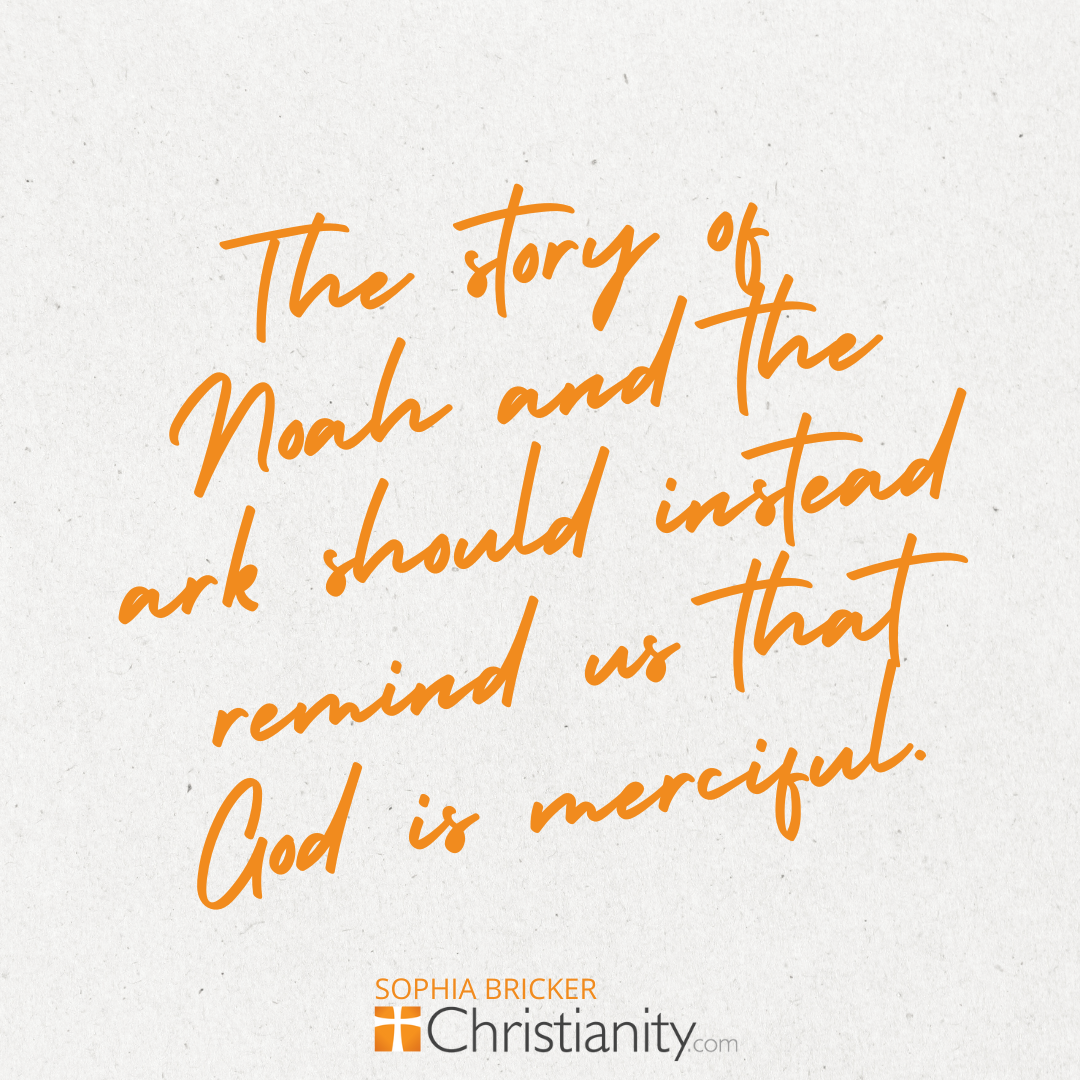Artwork of the biblical flood often includes the depiction of people struggling to find shelter and clinging to rocks in desperation. Many of us view these pieces of art and feel a pang of sympathy. We do not like to imagine the pain and horror they felt when the waves finally swept over them. Our thoughts may even turn to major catastrophes we have heard about, like the terrible 2011 tsunami and earthquake that hit Japan or the recent tragedy of floods in the United States.
Yet comparing recent floods to the one in Genesis is like comparing a common hailstorm to the divine judgment on Sodom and Gomorrah. They are not the same. The great flood of Noah’s day was unprecedented, and a deluge of that size will never occur again. Artwork of that biblical event might evoke pity in us, but we are wise to remember why judgment was sent on that day. For God did not just allow the flood to occur, He sent it to serve a righteous purpose.
Humankind’s Increasing Wickedness
Scripture tells us that during the period leading to the flood, humans were increasing in wickedness. As described in Genesis,” The LORD saw how great the wickedness of the human race had become on the earth, and that every inclination of the thoughts of the human heart was only evil all the time” (Genesis 6:5, NIV). Of course, the thoughts of humankind have been evil ever since the Fall. During the antediluvian period, though, God saw that the levels of depravity had increased to an all-time high.
Theologians and scholars often focus on the Nephilim and the mention of the “sons of God” marrying the daughters of men as the cause of the flood. The Nephilim were known as mighty men, renowned for their strength, and they could have used this power for nefarious purposes (Genesis 6:4). Commentaries include multiple explanations of who these offspring of the “sons of God” were, whether a result of the line of Seth intermingling with the line of Cain, or angels marrying women. Many theological issues arise with this discussion, especially in regard to angels intermingling with human women. Jesus specifically said that angels do not marry, which is what we would expect since they are spiritual beings (Matthew 22:30). Also, the passage mentions that the Nephilim were around after the flood (Genesis 6:4). To make these individuals the reason for the entire flood, then, is not being consistent with the rest of Scripture.
Instead, the account emphasizes that during the days of Noah, the earth was filled with violence and had been corrupted by it (Genesis 6:11). After the floodwaters receded, and Noah and his family left the ark, part of the promise that God made referred to the land formerly being cursed and a condemnation of murder (Genesis 8:21-22; 9:4-6). The Lord had earlier cursed the ground because of Cain’s shedding of Abel’s blood (Genesis 4:10-12). He had declared that no crops would ever grow for him again – an intense punishment for a worker of the soil. This curse on the ground made it even harder to work the soil. Hence, Lamech had given his son a name that sounded like “comfort,” with the hope that Noah would provide comfort amid the painful toil of working the cursed ground, an already arduous task that increased when widespread violence filled the earth (Genesis 5:29).
To murder is to sin against the created order, for we were made in the image of God. Cain had already killed his brother, shedding his blood on the earth. Much more blood joined Abel’s, further defiling the good creation the Lord had made. God would not put up with such wickedness forever – justice had to be carried out.
The wickedness that filled the earth during the days of Noah may have been influenced in part by the Nephilim, as many commentators have speculated. However, the wider context suggests that it was violence and ungodliness, specifically widespread murder, that led to God sending the flood. This is why the Lord emphasized the penalty of taking a person’s life, forbade Noah from eating meat with lifeblood in it, and promised He would never curse the ground again, as He had after Cain murdered Abel.
The Flood: A Result of God’s Sorrow and Wrath
Seeing the overwhelming evil in humankind, the Lord was sorry that He had created them. Many English versions of the Bible say that God regretted what He had made. However, the word can also refer to sadness and grief (Genesis 6:6, NLT and NKJV). He felt sorrow over humanity’s sinfulness and the corruption they had brought to the rest of the world (Genesis 6:6-8).
Thus, God declared that He would destroy the earth and everything in it. He told Noah, the only man who walked with the Lord, that “I am going to put an end to all people, for the earth is filled with violence because of them. I am surely going to destroy both them and the earth” (Genesis 6:13, NIV). Not only was the Lord grieved about the evil in the world, but he was also righteously angry. People were living without regard for God and openly defied Him by murdering others, defacing the sacred Imago Dei. Such actions had to be punished.
After He had warned Noah and his family, and they had built the ark, God sent rain and unleashed the fountains of the deep in His wrath (Genesis 7:11-12). The world was destroyed by water, washing away every living creature and human being until Noah, his family, and the animals on the ark were the only ones left alive. No more would these people use their strength to snuff out the life of another person or creature. No more would they corrupt the earth with the blood they had spilled. No more would their wickedness rise up before the Lord, paining Him with the remembrance of their evil. God had judged righteously by sending the great deluge.
What This Means (and Doesn’t Mean) for Us Today
We must be careful not to use the Genesis flood as an argument that natural disasters that occur today are the result of God’s judgment. The Lord can control the weather, oceans, and earth. But we also must remember that we live in a fallen world. Consequences of sin include terrible catastrophes like earthquakes, tsunamis, and floods, which occur “naturally” in the present broken system. With the death tolls and devastation of these events, we should recognize that the Lord is not the origin of these evils. He allows them, yes, as a consequence of Adam’s sin, but we should not view them as sent by God in wrath as He did during the time of Noah.
The story of Noah and the ark should instead remind us that God is merciful. He preserved the life of Noah, his family, and pairs of all the animals to save them from the judgment. Once the flood waters receded and Noah again stood on the earth, the Lord made a promise to all creation that He would never flood the earth again. The rainbow serves as a sign of this covenant, a beautiful part of nature that we can look at after a storm to recall the mercy of our God (Genesis 9:13-17).

He also promised that the ground, or earth, would never be cursed again, in context to the curse on Cain. Crops did not grow for Cain, or any who murdered. After the flood, the Lord poetically assured us that “As long as the earth endures, seedtime and harvest, cold and heat, summer and winter, day and night will never cease” (Genesis 8:22, NIV). The overall curse on creation because of Adam and Eve still applies until the restoration of all things (Genesis 3:17-19). However, our work by the sweat of our brow will produce crops. We can trust that the earth, though once badly defiled by bloodshed, will continue to yield its fruit and vegetation in season to feed the animals of the world and human beings.
In addition to these promises, the act of sending the flood also shows us that the Lord notices and cares about the problems that occur in the world. When we read about a tragedy or experience devastation in our lives, we can sometimes think that God does not care. Yet, if we turn our thoughts to the sorrow of God during the time of the flood, we understand that the wickedness in the world pains our Lord. He finds no joy in our suffering or in the evil actions of others. By condemning murder, God demonstrates the value of human life. Hence, He sent the flood to bring righteous judgment against those who were sold out to wickedness. And in the future, He will judge the earth again – this time not with water, but with fire – bringing justice against the evil in the world (2 Peter 3:6-10).
Reflecting on the flood reminds us of how mercy triumphs over judgment, for our Lord saved Noah from the deluge and He will save all who place faith in His Son from the coming judgment (2 Peter 2:5, 9-10; see also 1 Thessalonians 1:10). Like Noah and his family, we might still have to witness and grieve the terrible evil in the hearts of others, and within ourselves. We can trust, though, that Jesus will return and He will bring renewal to creation and to our bodies. No longer will we have to endure the inner warring against the sinful nature; we will be freed from the curse of sin (Revelation 22:3). Death and sorrow will be swallowed up with eternal life (Isaiah 25:8; 1 Corinthians 15:54).
Far greater than the beauty and fruitfulness of the post-flood world will be our everlasting life with God on the New Heaven and New Earth.
Photo Credit: ©Unsplash/Jakob Owens





